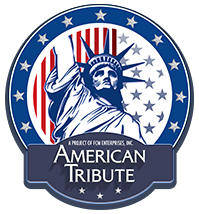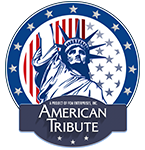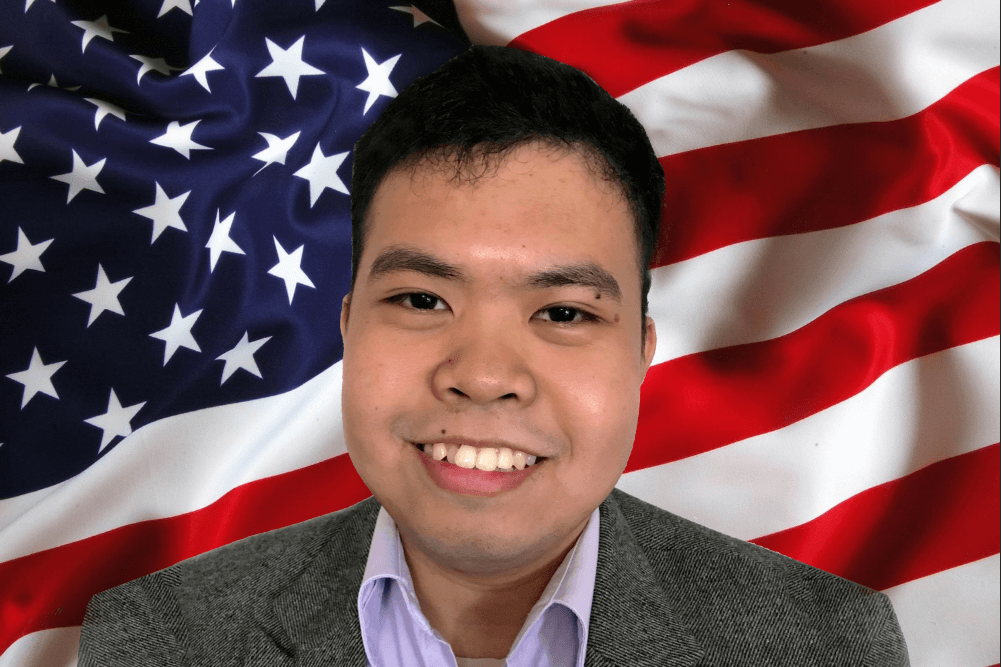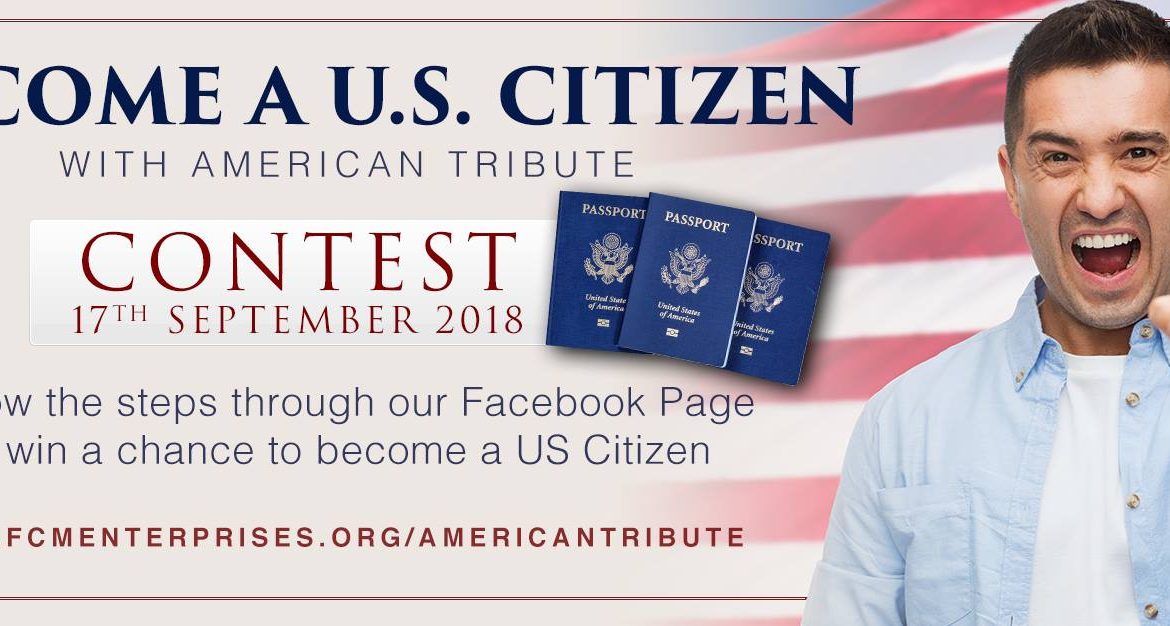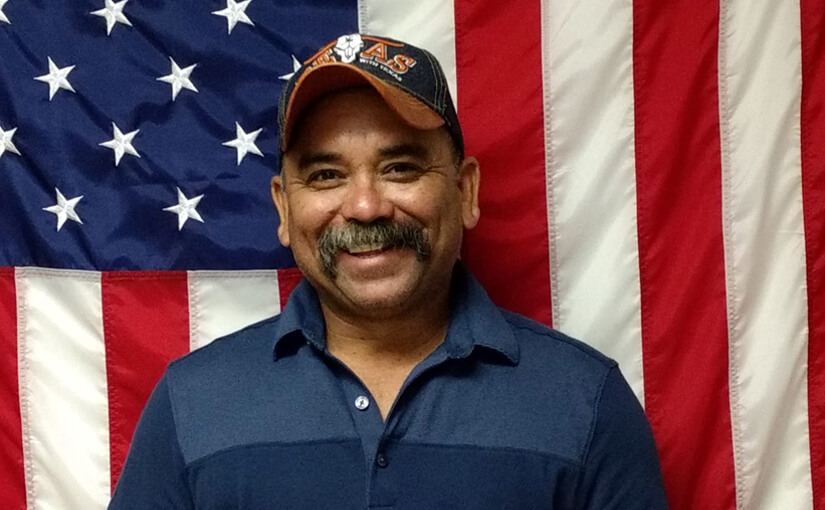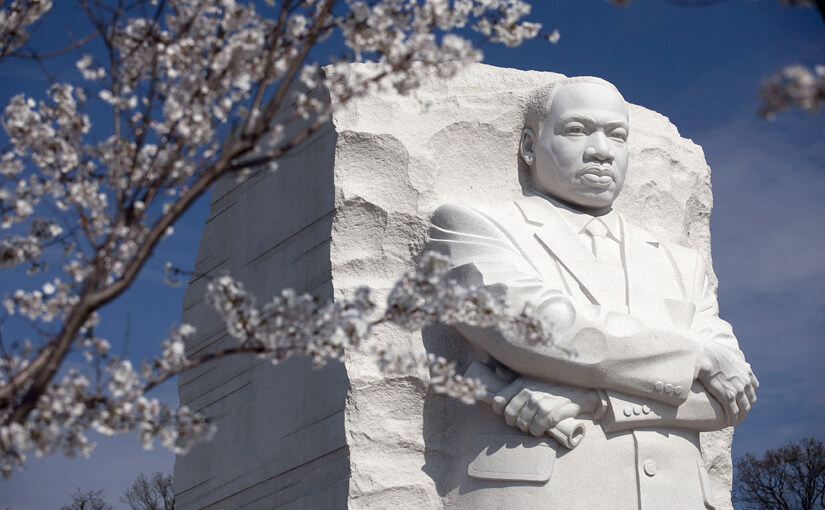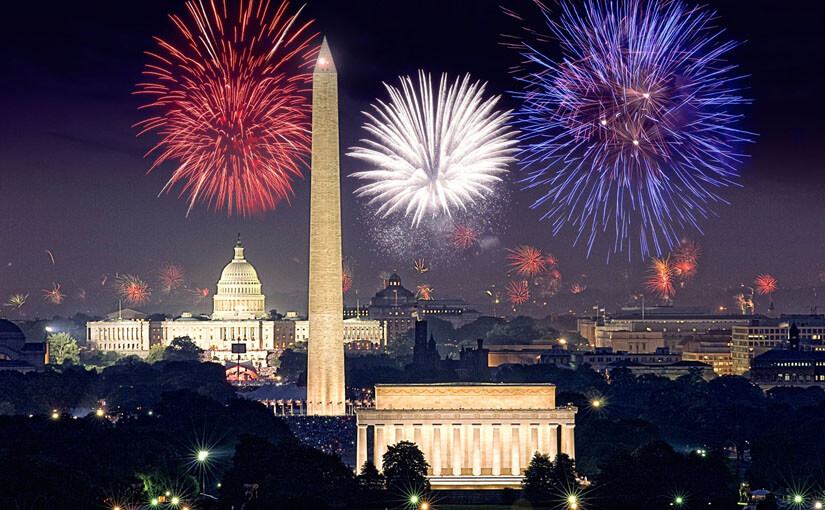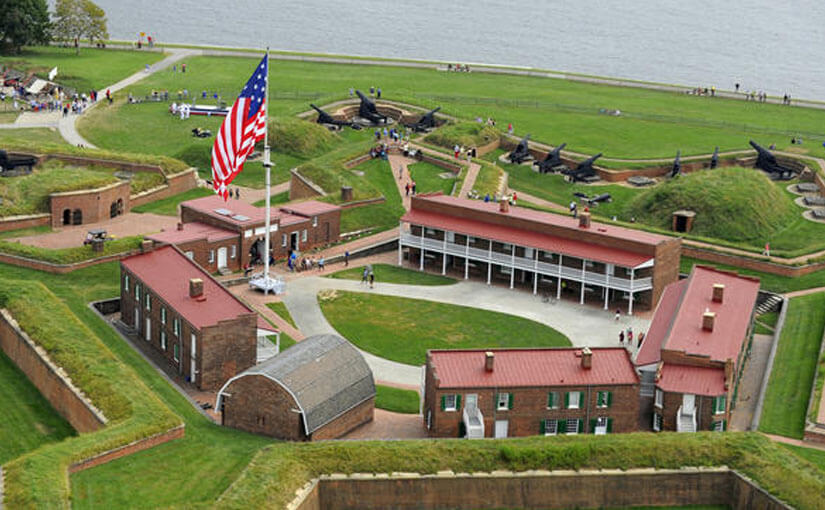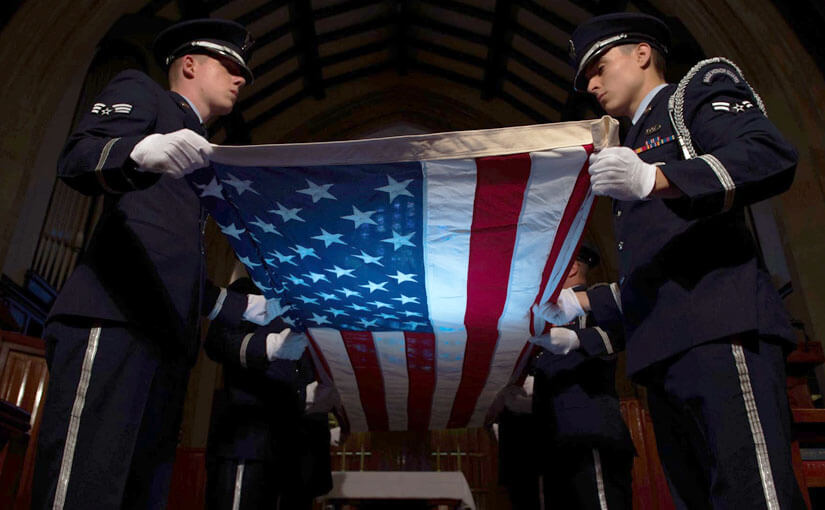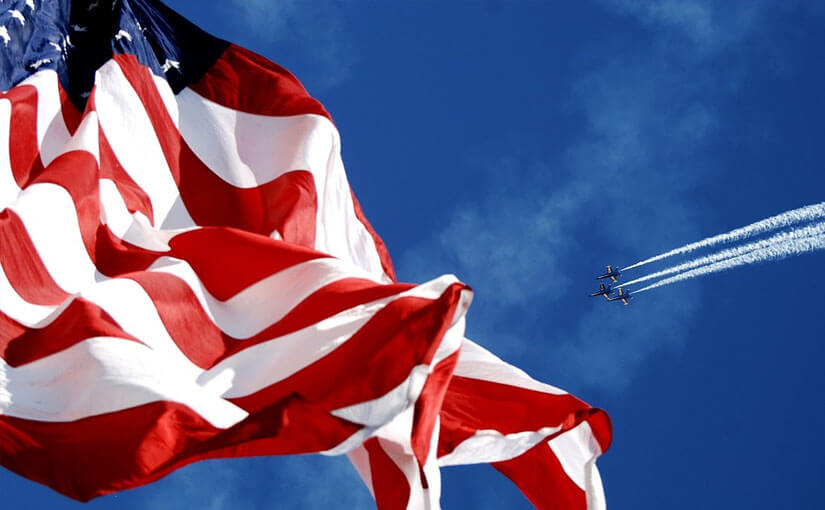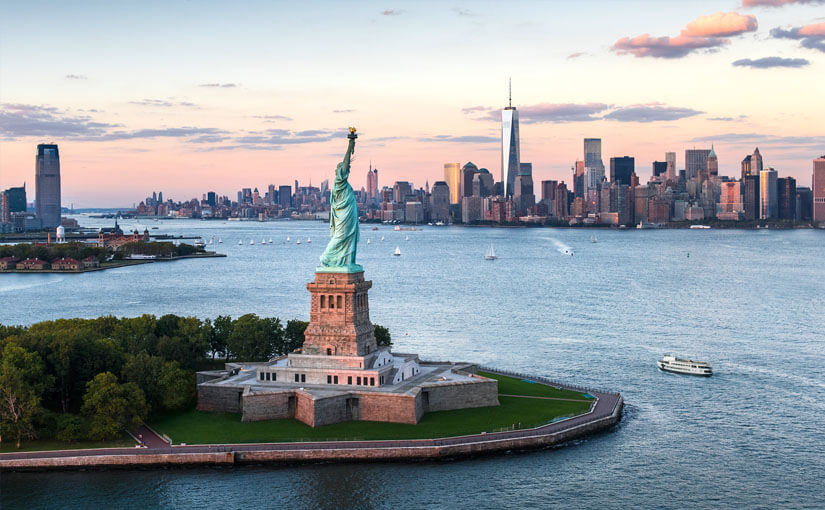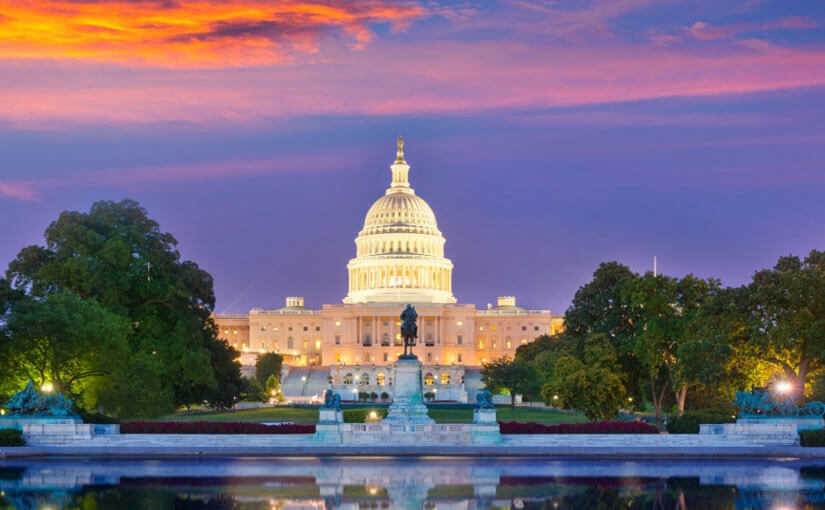The winner of the contest to have his naturalization fees paid is Jose Vien Torres from San Bernardino, California!!
Jose is looking forward to the day he can raise his hand and be sworn in as a U.S. Citizen !!
What are you waiting for? Make 2019 the year that you “join the team” !!
Remember, we will have another contest very soon!!
#AmericanTribute #BecomeAUSCItizen #FCMEnterprises #ToBeAmerican #QuickCivicsLessons #NaturalizationTest #USCitizenship #USCIS ![]()
Category: Test Questions
American Tribute is sponsoring a “Constitution Day” contest
Make 2018 the year that you become a U.S. Citizen! American Tribute is sponsoring a “Constitution Day” contest to have your USCIS fees paid when you submit your application for naturalization.
Make sure you read the complete rules before you enter!
You must have “liked” the Facebook page of American Tribute.
Enter by private messaging the Facebook page “American Tribute” in English.
You must include contact information (email or phone number) and the phrase:
“I want to be an American! The Constitution is the supreme law of the land!” in the message.
Before the drawing, you will be contacted to ensure that you are eligible.
You must be a permanent resident, live in the United States, and are otherwise eligible to naturalize. See https://www.uscis.gov/us-citizenship/citizenship-through-naturalization/path-us-citizenship to determine if you are eligible to naturalize.
You must not have a criminal record.
A winner will be chosen from the valid entries by random drawing at 7 a.m. Central time on September 17, 2018 – Constitution Day! We will make every effort to post the name of the winner as soon as possible after noon Central time.
The winner will have until September 25, 2018 to confirm eligibility and prepare N-400 paperwork.
If the winner does not have a completed N-400 by September 25, 2018, the prize will expire.
American Tribute reserves the right to select an alternate winner if the initial winner is ineligible.
This is not a cash prize – American Tribute will pay your USCIS fee to submit your form N-400 Application for Naturalization, but WILL NOT pay you any money directly.
The winner agrees to allow publication of their name and image on the American Tribute website and Facebook page, both after winning the contest and after they become a U.S. citizen.
This contest is not an offer of legal representation.
Determination of eligibility is subject to review by the Project Manager.
American Tribute is a project of FCM Enterprises, Inc., a 501(c)(3) non-profit corporation.
#AmericanTribute #BecomeAUSCItizen#FCMEnterprises #ToBeAmerican#QuickCivicsLessons #NaturalizationTest#USCitizenship #USCIS
4th of July Contest Winner!!
The winner of the contest to have his naturalization fees paid is Jesús Chávez of Midland!!
Jesús is looking forward to the day he can raise his hand and be sworn in as a U.S. Citizen !!
What are you waiting for? Make 2018 the year that you “join the team” !!
Remember, we will have another contest in September 17th, for Constitution Day!!
#AmericanTribute #BecomeAUSCItizen #FCMEnterprises #ToBeAmerican#QuickCivicsLessons #NaturalizationTest #USCitizenship #USCIS ![]()
100. Name two national U.S. holidays.
- New Year’s Day
- Martin Luther King, Jr. Day
- Presidents’ Day
- Memorial Day
- Independence Day
- Labor Day
- Columbus Day
- Veterans Day
- Thanksgiving
- Christmas
Many Americans celebrate national or federal holidays. These holidays often honor people or events in our American heritage.
These holidays are “national” in a legal sense only for federal institutions and in the District of Columbia. Typically, federal offices are closed on these holidays. Each state can decide whether or not to celebrate the holiday. Businesses, schools, and commercial establishments may choose whether or not to close on these days.
Since 1971, federal holidays are observed on Mondays except for New Year’s Day, Independence Day, Veterans Day, Thanksgiving, and Christmas.
** As you prepare for U.S. citizenship, Learn About the United States: Quick Civics Lessons will help you study for the civics and English portions of the naturalization interview. There are 100 civics (history and government) questions on the naturalization test. During your naturalization interview, you will be asked up to 10 questions from the list of 100 questions. You must answer correctly six (6) of the 10 questions to pass the civics test.
99. When do we celebrate Independence Day?
- July 4
In the United States, we celebrate Independence Day on July 4 to mark the anniversary of the adoption of the Declaration of Independence.
After signing the Declaration of Independence, John Adams wrote to his wife, “I am apt to believe that it will be celebrated, by succeeding Generations, as the great anniversary Festival.”
The Declaration of Independence, written by Thomas Jefferson, explained why the colonies had decided to separate from Great Britain.
Americans celebrate the Fourth of July as the birthday of America, with parades, fireworks, patriotic songs, and readings of the Declaration of Independence.
** As you prepare for U.S. citizenship, Learn About the United States: Quick Civics Lessons will help you study for the civics and English portions of the naturalization interview. There are 100 civics (history and government) questions on the naturalization test.
During your naturalization interview, you will be asked up to 10 questions from the list of 100 questions. You must answer correctly six (6) of the 10 questions to pass the civics test.
98. What is the name of the national anthem?
- The Star-Spangled Banner
During the War of 1812, British soldiers invaded the United States. On the night of September 13, 1814, British warships bombed Fort McHenry. This fort protected the city of Baltimore, Maryland.
An American named Francis Scott Key watched the bombing and thought that the fort would fall.
As the sun rose the next morning, Key looked toward the fort. He saw that the flag above the fort was still flying. This let him know that the British had not defeated the Americans.
Key immediately wrote the words to a poem he called the “Defence of Fort M’Henry.” The words of the poem became “The Star-Spangled Banner.”
Congress passed a law in 1931 naming “The Star-Spangled Banner” the official national anthem.
Here are the words to the first verse of the national anthem:
The Star-Spangled Banner
Oh, say, can you see, by the dawn’s early light,
What so proudly we hailed at the twilight’s last gleaming?
Whose broad stripes and bright stars, thro’ the perilous fight;
O’er the ramparts we watched, were so gallantly streaming.
And the rockets red glare, the bombs bursting in air,
Gave proof through the night that our flag was still there.
Oh, say, does that star-spangled banner yet wave
O’er the land of the free and the home of the brave?
** As you prepare for U.S. citizenship, Learn About the United States: Quick Civics Lessons will help you study for the civics and English portions of the naturalization interview. There are 100 civics (history and government) questions on the naturalization test.
During your naturalization interview, you will be asked up to 10 questions from the list of 100 questions. You must answer correctly six (6) of the 10 questions to pass the civics test.
97. Why does the flag have 50 stars?
- Because there is one star for each state
- Because each star represents a state
- Because there are 50 states
Each star on the flag represents a state. This is why the number of stars has changed over the years from 13 to 50. The number of stars reached 50 in 1959, when Hawaii joined the United States as the 50th state.
In 1777, the Second Continental Congress passed the first Flag Act, stating, “Resolved, That the flag of the United States be made of thirteen stripes, alternate red and white; that the union be thirteen stars, white in a blue field, representing a new Constellation.”
** As you prepare for U.S. citizenship, Learn About the United States: Quick Civics Lessons will help you study for the civics and English portions of the naturalization interview. There are 100 civics (history and government) questions on the naturalization test.
During your naturalization interview, you will be asked up to 10 questions from the list of 100 questions. You must answer correctly six (6) of the 10 questions to pass the civics test.
96. Why does the flag have 13 stripes?
- Because there were 13 original colonies
- Because the stripes represent the original colonies
There are 13 stripes on the flag because there were 13 original colonies. We call the American flag “the Stars and Stripes.”
For 18 years after the United States became an independent country, the flag had only 13 stripes.
In 1794, Kentucky and Vermont joined the United States, and two stripes were added to the flag. In 1818, Congress decided that the number of stripes on the flag should always be 13.
This would honor the original states that were colonies of Great Britain before America’s independence.
** As you prepare for U.S. citizenship, Learn About the United States: Quick Civics Lessons will help you study for the civics and English portions of the naturalization interview. There are 100 civics (history and government) questions on the naturalization test.
During your naturalization interview, you will be asked up to 10 questions from the list of 100 questions. You must answer correctly six (6) of the 10 questions to pass the civics test.
95. Where is the Statue of Liberty?
- New York (Harbor)
- Liberty Island
[Also acceptable are New Jersey, near New York City, and on the Hudson (River).]
The Statue of Liberty is on Liberty Island, a 12-acre island in the New York harbor. France gave the statue to the United States as a gift of friendship.
French artist Frederic-Auguste Bartholdi made the statue. It shows a woman escaping the chains of tyranny and holding a torch symbolizing liberty.
The Statue of Liberty was dedicated on October 28, 1886, 110 years after the signing of the Declaration of Independence. President Grover Cleveland accepted the gift for the American people.
The Statue of Liberty is a well-known symbol of the United States and of freedom and democracy. The Statue of Liberty became a symbol of immigration because it was located next to Ellis Island, which was the first entry point for many immigrants during the great waves of immigration.
The Statue of Liberty was the first thing new immigrants saw as they approached New York harbor.
** As you prepare for U.S. citizenship, Learn About the United States: Quick Civics Lessons will help you study for the civics and English portions of the naturalization interview. There are 100 civics (history and government) questions on the naturalization test.
During your naturalization interview, you will be asked up to 10 questions from the list of 100 questions. You must answer correctly six (6) of the 10 questions to pass the civics test.
94. What is the capital of the United States?
- Washington, D.C.
When the Constitution established our nation in 1789, the capital of the United States was in New York City.
Congress soon began discussing the location of a permanent capital city. In Congress, representatives of northern states argued with representatives of southern states. Each side wanted the capital to be in its own region.
As part of the Compromise of 1790, the capital would be located in the South. In return, the North did not have to pay the debt it owed from the Revolutionary War.
George Washington chose a location for the capital along the Potomac River between Maryland and Virginia. As part of the compromise, Philadelphia, Pennsylvania, became the temporary new location for the capital.
In 1800, after 10 years, the capital was moved to its current location of Washington, D.C.
** As you prepare for U.S. citizenship, Learn About the United States: Quick Civics Lessons will help you study for the civics and English portions of the naturalization interview. There are 100 civics (history and government) questions on the naturalization test.
During your naturalization interview, you will be asked up to 10 questions from the list of 100 questions. You must answer correctly six (6) of the 10 questions to pass the civics test.
